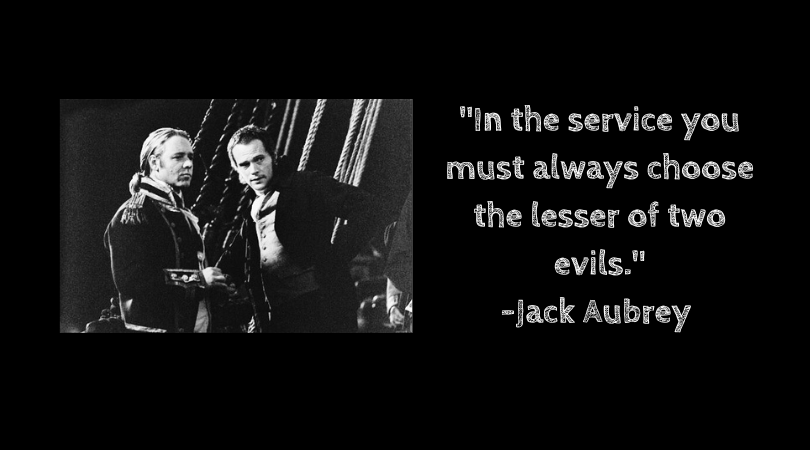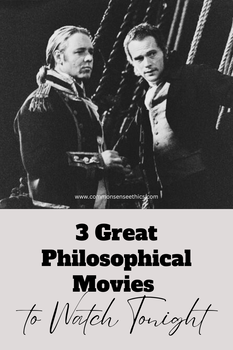For those who haven't seen these films, while I summarize and discuss the philosophical themes, I think I have been careful not to reveal anything that would spoil the movie or reveal the entire plot.
Finally, before we dive in, one other excellent movie that tops my list of philosophical films is the sword and sorcery film Solomon Kane, but I already did a detailed write-up of it back in 2016 that you can read here. Now, let's discuss three other great philosophical films to watch tonight:
Master and Commander (2003)
Russel Crowe is at his best as British Naval Captain Jack Aubrey in this amazing film adaptation of the excellent 21 book Aubrey-Maturin series of historical fiction by Patrick O'Brian. As much an action movie as a period piece (and you can read my list of the 10 best period drama movies here), the film follows "Lucky Jack," and his ship the HMS Surprise, around South America during the Napoleonic Wars. Along with his friend Stephen Maturin, ship's doctor, Lucky Jack pursues a larger and faster French frigate, Acheron, hell bent on taking the war into the Pacific. The film features several excellent battle sequences, and what happens between the naval battles is just as interesting with a naturalist's visit to the Galapagos Islands, evasion of the enemy, and conflict aboard the ship.
Aubrey and Maturin are a likable and persuasive a pair of characters, and their friendship is as compelling as any in fiction, elucidating the themes of duty, morality, and reason. Maturin is an idealist, Aubrey a military man and realist, and the dialog between them is fascinating at times. In spite of Aubrey’s bluster and talk of “the service,” he is also a humanitarian and wit, with a surprising degree of feeling.
Master and Commander is a philosophical film in many ways, as it explores questions like: What constitutes just rule? What makes a good leader? Do people need governance and when does such governance cross the line into tyranny? What is fellowship and what happens when we deny fellowship to others? When is it alright to choose the lesser of two evils? Does pride cause us to make mistakes? What of the corrupting influence of power?
Director Peter Weir invites us to contemplate these issues. Even when he raises the theme of power corrupting, he provides a counter-example of Admiral Horatio Nelson, the most powerful man in the British Navy at the time, for whom Aubrey has nothing but admiration. Will Aubrey allow his prideful pursuit of the larger faster French ship to trump his moral obligations to others?
This movie is an underrated masterpiece, and I can't recommend it highly enough.
My Dinner with Andre (1981)
Struggling playwright Wally is having dinner with his old friend Andre, who he has been avoiding since Andre left his career as a theater director in 1975 and embarked on an extended midlife crisis where he traveled around exploring eastern spirituality, near-death experience, and utopian communes.
While the movie might be slow-paced for some audiences, this 1980s art-house hit is definitely not boring, even though the film takes place almost entirely inside the New York French restaurant where Wally and Andre and are dining.
As the conversation progresses, we learn that Andre believes that technological progress is wrong and only hurts people. Andre also idealizes Asian cultures and espouses tropes of Orientalism when he talks about his “enlightening” experiences with Tibetan life and peoples.
Wally becomes increasingly confused by Andre's new beliefs and behaviors, challenging some of the methods and purpose of Andre's experiences. Yet it is clear that Wally is not necessarily totally convinced of his own more traditionally western, scientific rationalist beliefs either.
While not necessarily a film I would want to watch over and over, this is an interesting movie driven by potent dialog about varied philosophical ideas.
The Reader (2008)
The Reader is almost like two films in one. The first half follows a passionate affair between a teenager (Michael) and a lonely working class woman (Hannah) in post WWII Germany. Michael discovers that Hanna loves being read to and their physical relationship deepens - Michael reads to her from The Odyssey, Huck Finn, and The Lady with the Little Dog. In spite of their intense affair, Hanna abruptly disappears and Michael is left confused and heartbroken. Eight years later, while Michael is a law student observing Nazi war crime trials, he is shocked to find Hanna back in his life, this time as a defendant in the courtroom.
Be warned: this film has a lot of sex. While the sex scenes didn't bother me per se, the film actually makes a good case as to why early sexuality, especially between adults and teens, is morally problematic. Note that the age of consent in Germany at the time was 15, so while there was nothing illegal about the relationship, 15 is quite young by contemporary American standards, where the age of consent is 18, and perhaps with good reason. It might be difficult for a teen to throw off the influence that such early experience has on them, as is the case with Michael. The relationship and the hurt it caused his still developing sense of self, haunt him years later.
Despite the sexuality, I suspect that many of those who don't like the film are offended by its treatment of the other major moral problem; the banality of evil. As an aside, this moral problem, first discussed in such terms by Hannah Arendt in response to the trial of Nazi Adolf Eichmann, is discussed in an interesting debate between Kevin Kennedy and Massimo Pigliucci in our book Stoicism Today: Selected Writings Volume 4. You can read their respective essays here and here. While I tend to agree with Kennedy that Arendt/Pigliucci are wrong about the banality of evil as it applies to Eichmann in particular, who seemed to know exactly what he was doing and was motivated by his psychopathy, Arendt/Pigliucci are probably correct that the evil of rank and file Nazis and average Germans was much more from ignorance/banality, chalked up to "just following orders," going along with the herd, and so on.
Interestingly, this problem of the banality of evil applies to Hannah in The Reader. When the judge asks her why she did what she did, her explanation reveals banality. But then she turns the question around on the judge asking, "What would you have done?" And it's a legitimate question. There are enormous pressures in all human societies to go along. Many people like to think that had they been there, they would have always been on the "right side of history." However recent events, where some were clamoring for the Covid unvaccinated to be punished or put into camps for example, really calls this assumption into question.
While Michael can't forgive Hannah for her secrets and her crimes, his response to her is what the film is truly about - the redemptive power of art through great literature.
I hope you have enjoyed this post and get a chance to watch the recommended films!
~
Read Next:
The Top 5 Personality Traits for Resisting Social Pressure, and How You Can Develop Them
Is It Fantasy That a Happy Life is All About Pleasant Experiences?
What the Game of Thrones Ending Really Means
Pin This/Save for Later:











